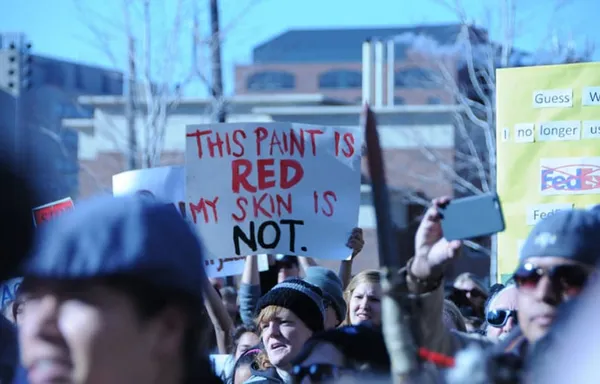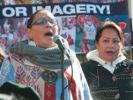Eye For Film >> Movies >> Dodging Bullets (2015) Film Review
Dodging Bullets
Reviewed by: Jennie Kermode

The week before this documentary premièred at the San Diego International Film Festival, a SO Supreme Court ruling was made preventing people in North Dakota from being registered to vote at PO boxes instead of conventional addresses. This single decision could disenfranchise around 18,000 Native people living in the state, just before the US' midterm elections. It's a ruling that harks back to the Jim Crow era of black voter suppression, and there is serious concern among Native peoples that it could impact rulings in other states. But shocking as this might seem to outsiders, for Native people it's just one more in a long history of outrages. Native people routinely experience discrimination, and this film provides an overview of that experience.
It opens with a teenager showing the camera operator around her house. There's the mark where a bullet hit the wall. Just over there, that's where one went through the refrigerator. Just here is where her brother died, shot by the police. Native people are more likely to be killed by the police than any other racial group in the country, but directors Kathy Broere and Bobby Trench don't worry about the statistics - they bring us human stories and let us figure the rest out for ourselves.

It began, one interviewee explains, when Europeans arrived on American shores and asked to speak to the men, although the women were the leaders. Broere and Trench are interested in the concept of historical trauma, the way that the slow but deliberate destruction of a civilisation has left the survivors with a distinct set of social and psychological problems which intersect with prejudice and discrimination in a cycle that perpetuates that destruction. It doesn't always take a finger on a trigger to end a life. Constant ridicule and social exclusion can do the job just as well. suicides are frequent; alcoholism and drug abuse provide another route. In the face of all this, it's hard to fight.
Dodging Bullets salutes the fighters: the protesters who tried to stop the oil pipeline traversing sacred land and cutting off water supplies at Standing Rock; the demonstrators trying to persuade the Washington Redskins that there's nothing sporting about persisting in the use of a racist name or a logo featuring a Native man's severed head. There's also a reflection on some of the atrocities of the recent past that few white Americans today are aware of, such as the taking of Native children, without their parents' consent, to effectively imprison them in boarding schools where they were taught vocational skills and many were sexually abused; again, personal stories give these an emotional weight that statistics alone couldn't bear.
The première of this film is also timely because we're close to Halloween. It provides an opportunity to challenge the stereotypes, the doomed warriors and submissive women that white people sometimes adopt as costume. This proprietary approach to Native traditions hints at something else - a sort of cultural amnesia, within mainstream America, a studied lack of awareness that Native people are still around and still affected by all this. Dodging Bullets is important as a vehicle for Native voices, a reminder that even if it's too late to right some historical wrongs, there's really no excuse to keep on doing harm. It has been theorised that it's easier to recognise someone's humanity when they fight back. Cinema can be a means of doing so.
Reviewed on: 14 Oct 2018















